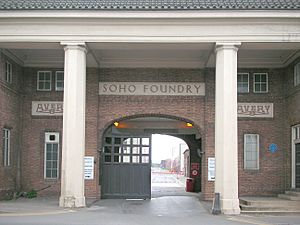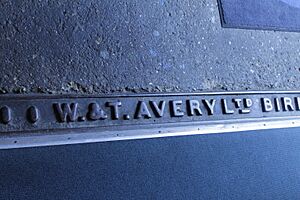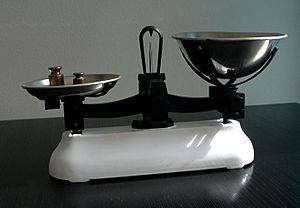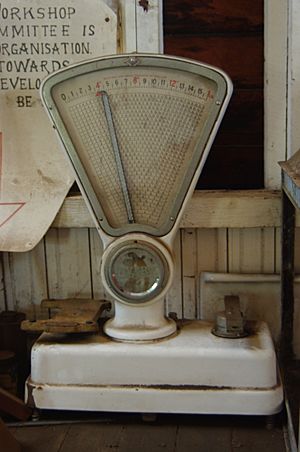- This page was last modified on 17 October 2025, at 10:18. Suggest an edit.
W & T Avery facts for kids

Main gate to the Soho Foundry, the company's head office
|
|
|
Formerly
|
W & T Avery (until 1979) |
|---|---|
| Industry | Weighing machines |
| Fate | Acquired by Weigh-Tronix to form Avery Weigh-Tronix |
| Successor | Avery Weigh-Tronix |
| Defunct | 2000 |
| Parent |
|
W & T Avery Ltd. (later known as GEC Avery) was a British company that made weighing machines. It started in the early 1700s and became W & T Avery in 1818. The company was bought by GEC in 1979 and changed its name to GEC-Avery.
In 1993, it became Avery Berkel after GEC bought a Dutch company called Berkel. Then, in 2000, Weigh-Tronix bought the company. It was renamed Avery Weigh-Tronix, but Avery Berkel continued as a brand name. The company is based in Smethwick, United Kingdom.
Contents
How the Company Started and Grew
The company's story began around 1730 when James Ford started a business in Digbeth. In 1813, William and Thomas Avery took over a scale-making business. By 1818, they renamed it W & T Avery.
The business grew very quickly. By 1885, they owned three factories. In 1891, the business became a limited company. Its shares were listed on the London Stock Exchange in 1894.
In 1895, the company bought the famous Soho Foundry in Smethwick. This was a former steam engine factory once owned by James Watt & Co. By 1897, the move was complete. The factory slowly changed from making steam engines to making weighing machines.
Around the year 1900, the company's leader, William Hipkins, worked hard to make the Avery name famous. He wanted the business to be known as a top maker of weighing machines. By 1914, the company covered a large area and had about 3,000 employees.
Growth and Changes Over Time
Between World War I and World War II, the company kept growing. It added special workshops for cast parts, paints, and weighbridge assembly. They also started making new products like counting machines, testing machines, automatic packing machines, and petrol pumps.
During World War II, the company also made different types of heavy guns. The factory was badly damaged by bombs during this time.
From 1931 to 1973, the company's main office was in an old building in Clerkenwell.
After World War II, weighing machine technology changed a lot. Old mechanical devices slowly disappeared. The company started using load cells and electronic weighing.
Becoming Part of Larger Companies
After almost 100 years of growing, GEC took over Avery in 1979. The managing director, Keith Hodgkinson, helped the company switch from mechanical to electronic weighing. They updated all their retail and industrial scales.
Avery Berkel started in 1993. This happened when GEC combined its GEC Avery business with a newly bought company called Berkel. The group continued as a part of GEC until March 2000.
In 2000, the US company Weigh-Tronix bought the business. They formed Avery Weigh-Tronix. Avery Berkel continued to be a brand name within the new company.
In 2007, Illinois Tool Works bought Avery Berkel from Avery Weigh-Tronix. A year later, Illinois Tool Works also bought Avery Weigh-Tronix. However, they kept the two companies separate.
In 2015, the Avery museum, which had been open for almost 90 years, closed down. Its collection was spread out.
Today, Avery Berkel is a brand and a major maker of commercial weighing machines. It is owned by Illinois Tool Works.
What Avery Berkel Makes Now
The Avery Berkel product range includes:
- ValuMax scale
- CodeChecker
- Intelligent Shelf Edge Labels (iSEL)
- Allergen labelling compliance
- Self-Service AI
- Linerless auto-cutter
See also
- Roberval Balance
- Weighbridge
- Sir William Beilby Avery




